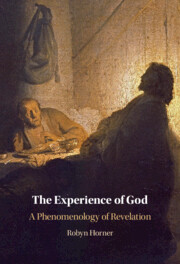Book contents
- The Experience of God
- The Experience of God
- Copyright page
- Contents
- Acknowledgements
- Part I The Problem in Context
- Part II Revelation in Contemporary Philosophy and Theology
- Part III The Event of Revelation
- Chapter 6 A Hermeneutic-Phenomenological Approach to Theology
- Chapter 7 Revelation Exceeds Experience
- Chapter 8 Revelation Affects Experience
- Part IV The Event in Person
- Bibliography
- Index
Chapter 7 - Revelation Exceeds Experience
from Part III - The Event of Revelation
Published online by Cambridge University Press: 13 October 2022
- The Experience of God
- The Experience of God
- Copyright page
- Contents
- Acknowledgements
- Part I The Problem in Context
- Part II Revelation in Contemporary Philosophy and Theology
- Part III The Event of Revelation
- Chapter 6 A Hermeneutic-Phenomenological Approach to Theology
- Chapter 7 Revelation Exceeds Experience
- Chapter 8 Revelation Affects Experience
- Part IV The Event in Person
- Bibliography
- Index
Summary
Chapter 7 considers how the event has been characterised in philosophy and the implications for theology. Concerned that opposition to it is generated by fear that it simply (re)asserts theistic beliefs, I examine how Marion’s understanding of the event can legitimately engage with the thought of others. Jean Grondin's views illustrate one extreme of that engagement. Caputo's analysis of the opposition between intuition and intention illustrates a need to discern whether a phenomenological approach to the event is being undertaken on the basis of theistic or atheistic beliefs, or whether a point earlier to that distinction is envisaged. Jean-Luc Nancy 's event takes place prepredicatively and it is cast in terms of an empty intentionality of faith. I suggest that this is reminiscent of hyperphasis. I look to Lieven Boeve to see how such a radical apophatics might work theologically. Boeve dialogues with Jean-François Lyotard, who thinks the event in terms of its emptiness and givenness to feeling. I then consider how Claude Romano thinks the event as prepredicative, and I use his criteria to discern whether a philosophical reading of the event would preclude a theological application.
Keywords
- Type
- Chapter
- Information
- The Experience of GodA Phenomenology of Revelation, pp. 126 - 151Publisher: Cambridge University PressPrint publication year: 2022

